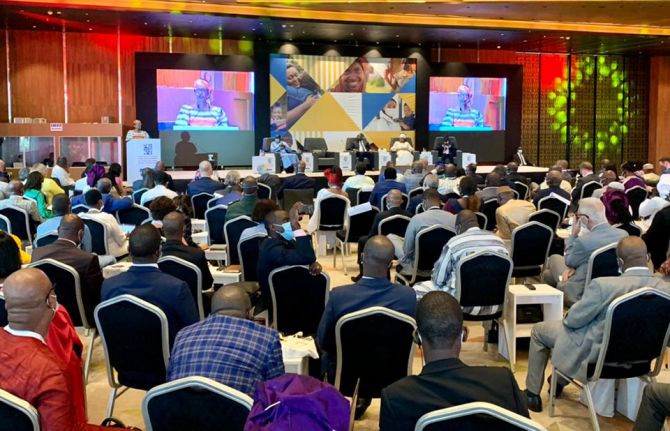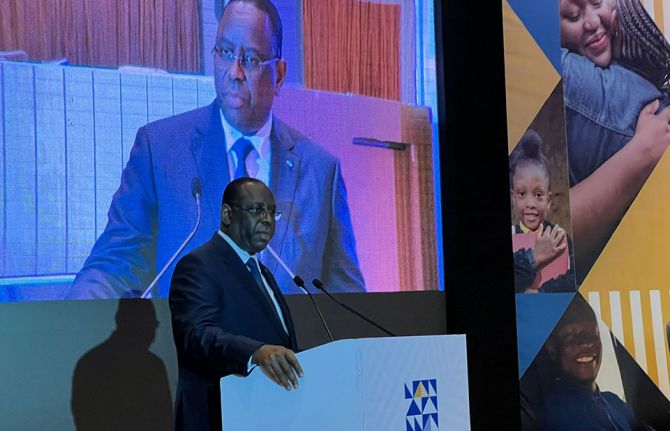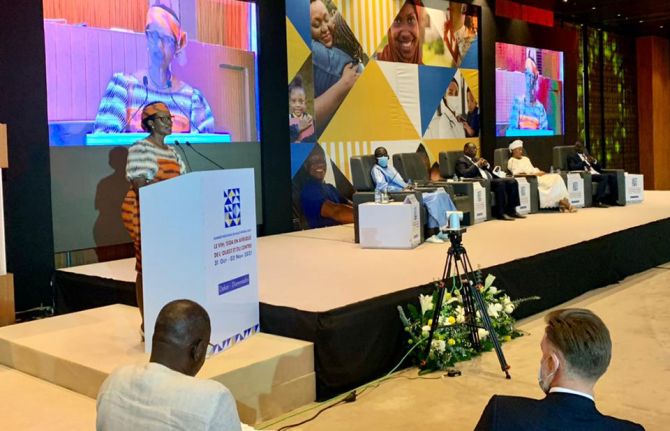



Press Release
Summit concludes with a call for action to reinvent the response to the HIV pandemic and end AIDS in Western and Central Africa
03 November 2021 03 November 2021The President of Senegal, Macky Sall, pledges an additional $3.5 million to support the HIV response and the call for action
DAKAR/GENEVA, 3 November 2021—A three-day regional summit on HIV/AIDS held in Dakar, Senegal, has concluded with a call to action that urges stronger support for community-led responses, policies driven by science and data, increased investment in the HIV response and putting HIV at the centre of pandemic preparedness and response. In his closing remarks, the President of Senegal, Macky Sall, committed to advancing the call to action with the African Union and pledged additional funds to implement it in Senegal and across the region.
Western and Central Africa is home to 4.7 million people living with HIV—12% of those living with HIV globally—but experiences 22% of all HIV deaths in the world. Countries in the region, on average, have seen slower declines in HIV infections than other countries on the continent and HIV prevalence in women is significantly higher than in men. Access to HIV testing and treatment reached 73% of people living with HIV in 2020, up from 38% in 2015, but short of the 81% goal that was set for 2020. The region has the world’s highest number of HIV-positive pregnant women still waiting for treatment, and just 24% of children living with HIV were virally suppressed.
The Dakar Call to Reinvent the Response to the HIV Pandemic calls for urgent action in four main areas:
1. Expand community-led infrastructure and organizations to strengthen national systems for health and shift policies to enable sustained funding for community organizations. Too many of the most vulnerable people in Western and Central Africa region do not have access to conventional health systems. Evidence shows community-led organizations and networks are critical to filling the gaps. This includes expanding the provision of HIV treatment and prevention services by community-led organizations in partnership with the public health system, ensuring that organized civil society and affected communities are included as key partners in decision-making bodies, and building accountability structures such as community-led monitoring.
2. Update health policies to align with the latest HIV science and evidence. Countries that have aligned their HIV policies and programmes with the current science have made greater progress against HIV/AIDS. Governments are urged to review their health policies in consideration of the latest scientific data and evidence. This is as a key step to improve the HIV response, and particularly to address the needs of those most vulnerable to HIV.
3. Increase national and international resources for HIV in the region by 33% by 2025 and remove financial barriers to access health services by people living with HIV. UNAIDS studies show that $2.67 billion by 2025, representing a 33% increase, would ensure sufficient funding for a comprehensive response to HIV in the region. Insufficient progress in the response to the HIV pandemic is only increasing the long-term costs that will strain already overburdened health budgets.
4. Put HIV and COVID-19 at the centre of pandemic preparedness and response. Many of the measures needed to accelerate the HIV response will also help prevent future pandemics. These measures include strengthening and protecting the formal and informal health workforce, collecting quality epidemic data to inform decision-making, implementing rights-based responses, and ensuring equitable access to new medical technologies.
These four actions are achievable in the next three years and would move the region closer to the 2025 global target of 95% of people knowing their HIV status; 95% of people who know their HIV status initiating treatment; 95% of people on treatment being virally suppressed. They would contribute to a dramatic reduction in the number of AIDS-related deaths and new HIV infections in the region.
Western and Central Africa has been at the forefront of some of the most innovative and successful efforts in the global response to HIV. Ending the AIDS epidemic as part of the 2030 Sustainable Development Agenda remains a priority even though the region faces multiple challenges including the response to the COVID-19 pandemic, numerous economic and security crises, and climate change.
During the summit governments, civil society actors, community-led organizations, scientists, and other partners reviewed new data and progress against HIV in the last 5 years and took note of the new UNAIDS Global AIDS Strategy 2021-2026 and the United Nations General Assembly Political Declaration on HIV and AIDS: Ending Inequalities and Getting on Track to End AIDS by 2030. The summit was co-organized by UNAIDS and the Civil Society Institute of HIV and Health in Western and Central Africa and hosted by the President of Senegal, Macky Sall. It was held with the support of Luxembourg and the Bill and Melinda Gates Foundation.
Quotes
“The key word today more than ever is mobilization. Let us mobilize for funding, for research and for vaccination. I am committed to working with you to advocate with the African Union and with partners to ensure that funding for the fight against HIV is strengthened and that this strengthening can begin with our African states themselves. I commit 2 billion CFA ($3.5 million) more in the fight against HIV, of which one billion will be given to the community fight by civil society and the other billion will go to the National AIDS Council to help people living with HIV.”
“Evidence shows the AIDS response is most effective when community-led organizations provide services as an integral part of the public response, are involved as co-planners, can highlight experiences and concerns, and play their essential role to ensure accountability. This conference issues a bold call to remove legal, policy and programmatic barriers that hold the region back from ending AIDS and to scale up resources to unleash the power of local organizations to help us end AIDS-related deaths and stop HIV infections.”
“This was an important development for West and Central Africa as the government of Senegal and UNAIDS co-hosted this high-level summit with civil society as equal partners-- showing what can happen when government, international stakeholders and civil society join together to respond to a pandemic.”
“If we want to achieve the SDGs, we need to increase public support for development. We need to strengthen systems that have suffered during the COVID-19 pandemic and make health systems more resilient.”
“We know that pandemics such as COVID-19, HIV and tuberculosis both exacerbate and thrive on inequalities—the world must take action to tackle inequalities and other barriers to health to end the HIV epidemic.”
“Paediatric care is weak in our region. Children born with HIV too often die from AIDS-related illnesses. We count on your leadership and political will so that children are no longer forgotten. For civil society, Dakar represents a new beginning.”
UNAIDS
The Joint United Nations Programme on HIV/AIDS (UNAIDS) leads and inspires the world to achieve its shared vision of zero new HIV infections, zero discrimination and zero AIDS-related deaths. UNAIDS unites the efforts of 11 UN organizations—UNHCR, UNICEF, WFP, UNDP, UNFPA, UNODC, UN Women, ILO, UNESCO, WHO and the World Bank—and works closely with global and national partners towards ending the AIDS epidemic by 2030 as part of the Sustainable Development Goals. Learn more at unaids.org and connect with us on Facebook, Twitter, Instagram and YouTube.
Contact
UNAIDSCharlotte Sector
tel. +41 79 500 8617
sectorc@unaids.org
UNAIDS
Tristan Gijsenbergh
tel. +221 77 480 3066
gijsenberght@unaids.org
